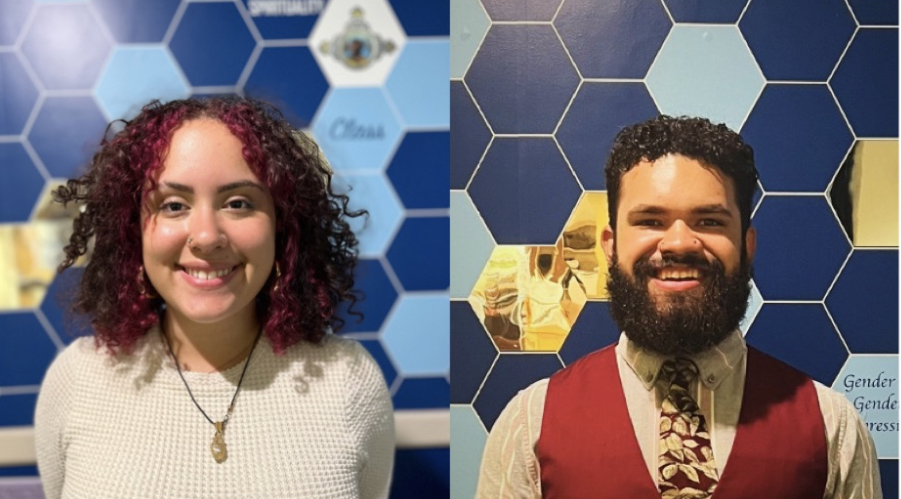Jon Guzman and Alondra Gomez are influential Hispanic/Latine student leaders at the University of Maine. Their consistent efforts in creating a more affirming space for BIPOC students should be honored rather than overlooked.
Guzman, a third-year student studying finance, serves as Multicultural Affairs Advisory Chair in the General Student Senate as well as an Ambassador and Peer Learning Assistant for the Maine Business School.
He defines himself as an Afro-Latinx person of Puerto Rican descent and was raised by a vast extended family in the Bronx, a borough of New York. His household’s primary language growing up was Spanish, so Guzman carried that fluency into adulthood.
Guzman describes the community within his city as diverse and uses the annual Puerto Rican Day Parade as an example of such. People from different regions of the nation are unified in Manhattan to spread music, food and voices as well as to perform.
“I don’t like to tell people that being Puerto Rican is a part of my personality, I just am a representation of what it means to be Puerto Rican. So, I love cooking the food, I love hearing the music, and I love going to whatever event revolves around being Puerto Rican-American. It’s just a culture that’s beautiful and all-encompassing,” said Guzman.
After having lived in the Bronx for 13 years, Guzman moved to Connecticut, where he served as the Hispanic Ambassador and established the seal of biliteracy in his district of Waterbury. He applied to UMaine on a whim after attending a local college fair.
Upon being accepted and offered an excellent scholarship, Guzman decided to travel here and become self-sufficient. After arriving, he immersed himself in the tight-knit community of fellow Hispanic Americans and was acquainted with BIPOC professors on campus.
“My main hobby is basically helping people, whatever I can do to help out my community. Whether that’s volunteering, whether that’s participating or going around to different events on- and off-campus, I will do it. That’s one of the main reasons why I became the multicultural advisory chair; just because there isn’t that representation in the senate,” said Guzman.
Guzman made the distinction that the General Student Senate is by no means hesitant in terms of electing BIPOC students to senate seats, but he expressed an apparent desire for more representation in government.
“They want to hear the voices they don’t normally hear. So, my goal is to bring that voice and also to encourage other individuals from the BIPOC community to come and apply to be on the senate, to have a voice on senate, to be a reflection of the student body, to be a reflection of the student identities that they represent.
Gomez is a third-year psychology student who runs the Caribbean and Latino Student Alliance. She has officially taken on the position of Resident Assistant for a second year and is currently employed at the New Balance Recreation Center.
“Food was a big part of my life because it was how my family expressed their love. Eating a hot meal with my dad and siblings is what would bring my family together at the dinner table after a long day. I think that through cooking Latino-style food for the people I love is how I honor my Hispanic heritage,” said Gomez.
Having grown up in Boston, Massachusetts, Gomez was brought up under Brazilian and Salvadorian cultures and immersed in a diverse group of people from a young age. She touched upon the hardship that goes hand-in-hand with transitioning from an environment enriched by diversity to what is considered a predominantly white university.
“I think that through running CALSA I’ve been able to gain more confidence in being expressive about my culture. CALSA is a club for all but most importantly, it is a club for people who share the same identity as being Latino or Caribbean. It’s a place where we can come together and feel like we’re being related to whether that’s because of our appearance, language, food or experiences, it forms a certain type of connection,” said Gomez.
Guzman noted that there is no actual definition of what it means to be Hispanic/Latinx. Identity crises throughout earlier days have been experienced by many, Guzman explained there are often preconceived notions about how BIPOC individuals are supposed to express their cultures. Similarly, a sort of expectation that you must have perfected the communication and traditions of your culture to “properly” identify with it.
“There is no definitive starting point to which you can begin exploring yourself. Starting the journey is all about feeling ready. Even if there is this unconscious fear within you, it’s being able to plunge into the unknown waters and explore the unexplored, which builds upon your progress,” said Guzman.
Gomez believes that UMaine can become more well-rounded in diversity by recognizing that there is, in fact, a systematic disparity between the white and BIPOC populations.
The university could further emphasize BIPOC groups on campus by increasing the promotion of their events and making it a priority to amplify the voices of those students, although they recognize that things do seem to be heading in the right direction as of lately.
For instance, in previous years, the multicultural center had been pushed to the back corner of the organization fair. This year, they were given a more prominent spot. Even so, there still needs to be representation of marginalized identities in student government, athletics, decisions and more.
“No matter where you are, you will always find your people and when you do find your people, that community will be so tight-knit. Even though it may not look as big as other groups on other campuses around the nation, we are stronger than ever,” said Guzman.








